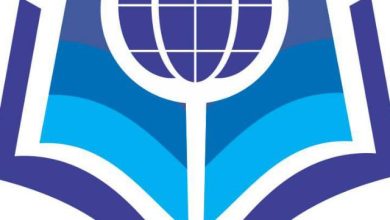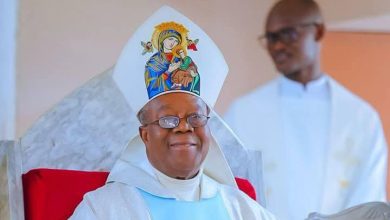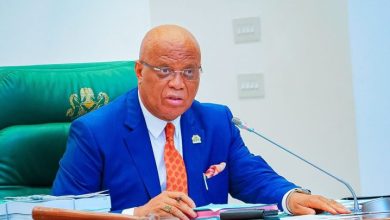AKWA IBOM STATE COUNCIL OF CHIEFS . . . Fostering Peace, Unity And Development
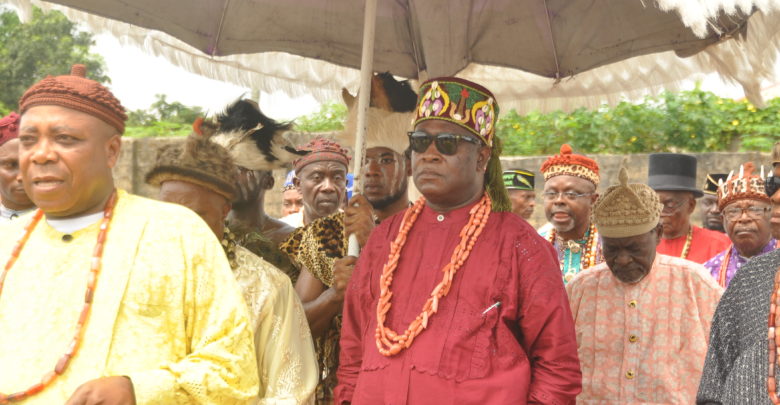
Akwa Ibom State and Her Revered Traditional Institution
Akwa Ibom is a state in Nigeria. It is located in the coastal South-Southern part of the country, lying between latitudes 4°321 and 5°331 North, and longitudes 7°251 and 8°251 East.
The State is bordered on the east by Cross River State, on the west by Rivers State, and on the South by the Atlantic Ocean and the southernmost tip of Cross River State. Akwa Ibom is one of Nigeria’s 36 states with a population of over 6 million people and more than 10 million people in diaspora. It was created on September 23, 1987 by the Military administration of General Ibrahim Babangida from the former Cross River State and is currently the highest oil and gas producing State in the country. The State’s capital is Uyo with over 500,000 inhabitants.
Akwa Ibom has an airport and two major seaports on the Atlantic Ocean with a proposed construction of a world-class seaport, Ibom Seaport. The state also boasts of a 30,000-seat ultramodern sports complex. It is shaped like the Allianz arena stadium and it has modern and world-class facilities. Akwa Ibom State is also home to the Ibom E-Library, a world-class information centre. Akwa Ibom State is also home a number of world class industries; Kings Flour Mill, Syringe Factory Limited, Electric Metering Company, Electricity substation, a Plywood Manufacturing Industry, Toothpick and Pencil factory, amongst others.
In addition to English, the main spoken language is Ibibio, which is understood by all indigenes, including other sub groups; Annang, Oron, and Obolo. The Ibibios are considered the fourth largest ethnic group in the country.
Before the advent of colonialism, the traditional institution was a formidable force of governance in Nigeria, which the people had great respect for, and the rule of law prevailed. The norms and values were upheld, while the traditional rulers had influence on their subjects. Although their influence has relatively weaned with the institutionalization of political governance, the traditional institution is still very much revered even as they have contributed to the peace and unity of the State. But how is the traditional institution structured in Akwa Ibom State, you may wonder?
Structure Of The Traditional Society
The Traditional Society in Akwa Ibom State is made up of a nuclear family of a man and his wife or wives and the children known as the “ufok” who combine with other “ufoks” with blood affinity to form the extended family or hamlet which are known as “ekpuk”. Various Ekpuks with blood relationship combine to form a Village known as “Idung”. Several Idungs combined to form a Clan which is called “Obio”. Several Obios make up a Local Government Area. Yet, how is this society administered?
Traditional System of Administration
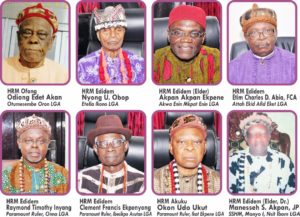
The Traditional System of Administration and Rulership in Akwa Ibom State comprised the ancient system, the present statutory system and the reformed traditional system. In the Traditional Ibibio society, the autonomous communities of the Ibibio Land were ruled by Obong Ikpaisong “Rulers of the Land and the Host or Principalities of the Land”. The Obong Ikpaisong stool/throne in Ibibio land is the combination of the sacred Office of Priest and Kingship. The Obong Ikpaisong is a Priest-King and performed both functions in the autonomous communities of the Ibibio Land within the Obios of his jurisdiction. The Obong Ikpaisong rules with the Mbong Idung (village heads) and the Mbong Ekpuks (family Heads) together with the Leaders/mbongs of the various traditional societies such as Obon, Ekpe, Ekpo, Nnabo, Agatha, Anyamkpe, Ekoong, among others. The various autonomous communities of the Ibibio collaborate and joins together with other Ibibio brothers known as iman to protect their common interest and defeat common enemies.
In the reformed Traditional Administration of Ibibio land, all the Paramount Rulers of Ibibio Land unite in one umbrella known as Ifim Ibom Ibibio to constitute the Supreme Council of traditional Rulers in Ibibio Land with a Supreme Traditional and Priestly Monarchy Throne or Stool called “Oku Akwa Abasi Ibom Ibibio” which means “the Priest of the Almighty God of the Ibibio” and shortened as “Oku Ibom Ibibio”. The Oku Ibom Ibibio is the Supreme Traditional/Priestly monarch of the Ibibio race/nation in Akwa Ibom State.
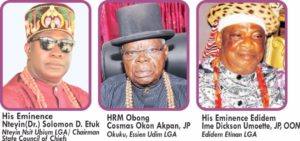
However, in modern statutory traditional system of Akwa Ibom State, the Traditional System of Administration comprises a Paramount Ruler for every local government who rules with Clan Heads, the Village Heads and the Family Heads. The Family Heads are known as Mbong Ekpuk, the Village Heads are known as Ete-Idung while the Clan Heads are known by the Traditional Titles and Offices in which their stools and thrones were known from the ancient times. The paramount Rulers are also known by the Traditional Titles and Offices in which their Offices were known from ancient times.
Interestingly, Akwa Ibom State has a robust traditional leadership system that predates modern means of governance. Ascendency to the stools are carefully done according law. Its contributions are quite enormous. It makes for hegemony and peaceful coexistence of the respective communities in the state and promote economic activities of the communities.
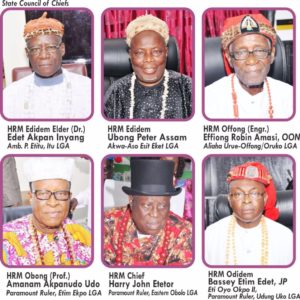
The tiers of traditional leadership as recognised and certificated by the State government are; a Paramount Ruler; a Clan Head and a Village Head. However, other ranks of leadership exist at family levels throughout the state, largely known as ‘Obong ufok’ – meaning ‘family heads’ and they also play complimentary roles in the administration of the villages. Villages and Clans as pointed out earlier constitute Local Government Areas. A paramount ruler is drawn from the ranks of clan heads through a process legally prescribed. Nevertheless, for the traditional rulers to function effectively in the interest of the entire State, the Akwa Ibom State Traditional Rulers Laws makes provision for the Paramount Rulers for the 31 Local Government Area of the State to come together under the aegis of Akwa Ibom State Council of Chiefs with a Chairman, who shall be a Paramount Ruler with the responsibility of directing the affairs of the Council. But what role do the council really play?
Powers Of The Council
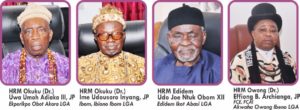
According to Akwa Ibom State Traditional Rulers Law, 2000 (as Amended). The Council has the following powers:
(a) to advice the Governor whenever requested to do so –
(i) maintenance of public order within the State or any part thereof; and
(ii) such other matters as the Governor may direct;
(b) to advise the Governor on any matter relating to customary law or cultural affairs, intercommunal relations and chieftaincy matters.
In addition to those functions conferred upon traditional rulers by this Law, the functions of a Chairman of a Council shall be –
(a) To uphold the traditions and culture of the clans constituting the Local Government Area of which he is the Chairman of the Council;
(b) to serve as a co-ordinating force among those Clans;
(c) to promote good relations between those Clans and the neighbouring Clans;
(d) to disseminate among the people of the Clans of his Local Government Area information emanating from all tiers of Government and to furnish the Local Government and tiers of Government with information relating to the problems and aspirations of those Clans; and
(e) to perform traditional and ceremonial functions not being functions that are repugnant to natural justice, equity and good conscience or incompatible with any written law for the time being in force in the State.
Past Chairmen of Akwa Ibom State Council of Chiefs
The seat of the Chairman, Akwa Ibom State Council of Chiefs is on a rotational basis among Paramount Rulers across the three Senatorial districts of the State.
Until recent years, each chairman served for one (1) year tenure but duration has been increased to two years. So far, 30 Paramount Rulers have sat on the exalted throne to serve the State as Chairmen of Akwa Ibom State Council of Chiefs.
HRM, Obong Nya Udo Inuaeyen from INI Local Government Area in Ikot Ekpene Senatorial District had the first shot in 1988. It was followed by HRM, Edidem Ekpeohong Atakpa IX from Itu Local Government Area in Uyo Senatorial District in the year 1989.
HRM, Obong Akpan Udo from Mkpat Enin Local Government Area in Eket Senatorial District emerged the Chairman in 1990. HRM, Obong Cosmas Akpan from Essien Udim Local Government Area in Ikot Ekpene Senatorial District served as the fourth Chairman in 1991.
It was followed by HRM, Nsobom Michael Udo Eka from Uyo Local Government Area in Uyo Senatorial District in 1992. HRM Ofong Mfon Afahaene Eyo from Oron Local Government Area in Eket Senatorial District joined in the period of 1993 through 1994.
HRM Okuku Etim Akpan Udo Ntekpere IV from Obot Akara in Ikot Ekpene Senatorial District took over in the period of 1994-1995. He was succeeded by HRM Nsobom Tom Essien Akpan Essien Ubong III from Nsit Ibom Local Government Area in Uyo Senatorial District in the period of 1995-1996.
HRM Edidem Inyang Effiong Nyong (MP) of Oron Local Government Area in Eket Senatorial District took over the reigns as Chairman in the period of 1996-1997. HRM Obong (Dr) Johnson Udokang Udom from Ukanafun in Ikot Ekpene Senatorial District served in the period of 1997-1998.
Thereafter, HRM, Usonyin Okon Ekpo Ekpo ( Oku Ibom Ibibio) from Ibesikpo Asutan Local Government Area in Uyo Senatorial District served as the 11th Chairman in the period of 1998- 1999. HRM Edidem (Dr) Akpabio Udo Ukpa ( Oku Ibom Ibibio) from Onna Local Government Area in Eket Senatorial District emerged the 12th Chairman in the period of 1999- 2000.
HRM, Obong Ekpenyong Okonko Udoutun from Ika Local Government Area in Ikot Ekpene Senatorial District took over as the 13th Chairman in the period of 2001-2002. He was succeeded by HRM John Dickson Ekwere (MFR) from Etinan Local Government Area in Uyo Senatorial District in the 2002. Unfortunately, HRM Ekwere did not stay to complete his reign. HRM, Nsobom Robert James Obot (FCA) from Nsit Ubium Local Government Area in Uyo Senatorial District emerged Chairman in the period of 2002-2003.
The 16th Chairman of Council was HRM, Ubong (Dr) Owen Sylvanus Ukafia Ede VI from Eastern Obolo in Eket Senatorial District during the period of 2003- 2004. He was succeeded by HRM Okuku ( Engr.) Augustus Jonah Ekpenyong Assiak from Ikot Ekpene Local Government Area in Ikot Ekpene Senatorial District during the period of 2004-2005.
HRM, Edidem Effiong Jimmy Iyawot from Nsit Ibom Local Government Area in Uyo Senatorial District took over the reins during the period of 2005-2006 as the 18th Chairman. HRM Odidem Etim Ati Okpo III from Udung Uko Local Government Area in Eket Senatorial District emerged as the 19th Chairman in the period of 2006 – 2007.
HRM Obong (Prof) Brown Esen Owoh from Oruk Anam Local Government Area in Ikot Ekpene Senatorial District served as Chairman in the period of 2007-2008. He was succeeded by HRM Edidem Ime Dickson Umoette from Etinan Local Government Area in Uyo Senatorial District during the period of 2008- 2009.
HRM, Edidem (Dr) Timtiniko Papaudo Enodien of Eket Local Government Area in Eket Senatorial District emerged Chairman of Council during the period of 2009-2010. He was followed by HRM Okuku Uwa Umo Adiaka II of Obot Akara Local Government Area in Ikot Ekpene Senatorial District during the period of 2010-2011.
After his reign, there came a renowned Traditional Father in the person of HRM, Okuku (Dr) Ime Udousoro Inyang (JP) from Ibiono Ibom Local Government Area in Uyo Senatorial District who served as the 24th Chairman, Akwa Ibom State Council of Chiefs during the period of 2011-2012. He was succeeded yet by another Traditional Father of no mean repute, HRM Edidem Udo Joe Ntukobom XII from Ikot Abasi Local Government Area in Eket Senatorial District during the period of 2012-2013.
HRM, Obong (Prof) Victor Noah Umoh of Ukanafun Local Government area in Ikot Ekpene Senatorial District emerged the 26th Chairman during the period of 2013-2014. He was followed by HRM Edidem (Surv.) Edem Silas Akpan from Uyo Local Government Area in Uyo Senatorial District during the period of 2014-2015.
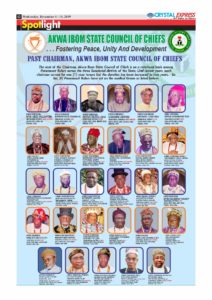
However, when Section 45 of the Akwa Ibom State Traditional Rulers Law, 2000 was amended, provision was now made for the Chairman of the Council to hold office for a period of two years
The first beneficiary of the amended law the HRM, Owong (Dr) Effiong Bassey Archianga, the Paramount Ruler of Ibeno Local Government Area in Eket Senatorial District who served during the period between 2015 and 2017. HRM Edidem Apostle Ntoeng Udo Effiong Akpan from Ini Local Government Area in Ikot Ekpene Senatorial District emerged the 29th Chairman during the period of 2017 through 2019.
During the period of his service, Apostle Ntoeng Udo Effiong Akpan retired to his ancestors. On September 23, 2019, the 30th Chairman of Akwa Ibom State Council of Chiefs was installed. Who would emerge on the throne on this epoch period of 30? Interestingly, it was no other person than His Eminence, Nteyin Solomon Daniel Etuk, the Oku Ibom Ibibio and Patriarch of Ibibio people Worldwide. But what really qualified him for the exalted office?
What qualifies the traditional father may not be unconnected to his rich background in the traditional institution.
Background in the traditional institution
A scion of the royal family of Daniel Ibok Etuk from Nung Ibok Ibok Ibok Udo Idiong in Ikot Ikpaidem in Nung Okubo of Ikot Okubo, Nung Ekpoh Ibiakpan Nsit, Western Nsit in Nsit Ubium, the monarch, was born on 21st September, 1958.
His ascension to the traditional stool has been steadily progressive. The mantle of leadership beckoned when he emerged as the Village Head of Ikot Ukobo, Nsit Ubium LGA in 1998. He was subsequently selected as the Group Head of Ibiakpan Group of nine (9) villages in 2004.
With his proven sterling leadership, the people of Western Nsit, comprising 32 villages unanimously chose him to serve as Clan Head in 2012.
The Royal Father later became the Paramount Ruler of Nsit Ubium Local Government Area which is made up of 64 Villages. Consequently, he became the President of Nsit Ubium Traditional Rulers Council (TRC), Akwa Ibom State.
What is more, his leadership acumen has attracted him to various organizations and institutions. In this wise, he has served in various peace and conflict resolution positions to include: Chairman, Police Community Relation Committee (PCRC) Nsit Ubium (2003-2005); Chairman, Akwa Ibom State Traditional Rulers Dispute Committee in 2017 and was also re-appointed in 2018 to serve as a member of the committee. As a man of wisdom, the Royal Father is a sound arbiter on issues of disputes/conflicts among disputants brought before him for peaceful and mutual co- existence.
Ascension To Ifim Ibom Stool
Satisfied with his enterprising communal lifestyle and successful leadership on the traditional stool, the Supreme Council of Ibibio Traditional Rulers (Ifim Ibom Ibibio) on Friday, September 14, 2018, unanimously selected Nteyin Solomon Daniel Etuk as the Oku Ibom Ibibio and President of the Council, meaning the patriarch of Ibibio Nation.
Upon the selection, he was accordingly proclaimed as the Oku Ibom Ibibio on Saturday, November 17, 2018, and on Monday, December 31, 2018, the revered monarch was formally coronated as the premier traditional ruler of the Ibibios.
As the Oku Ibom Ibibio, Nteyin Solomon Daniel Etuk, JP, is the President of the Supreme Council of Ibibio Traditional Rulers.
His Eminence is currently the Chancellor of the Akwa Ibom State University, Ikot Akpaden, Mkpat Enin Local Government Area. He was appointed to the position by the Governor of Akwa Ibom State in April, 2019 and on 31st October, 2019 he was installed formally to the position. But how then did he emerge Chairman, Akwa Ibom State Council of Chiefs?
Emergence As Chairman, Council Of Chiefs
As stated earlier, the seat of the Chairman, Akwa Ibom State Council of Chiefs is on a rotational basis among Paramount Rulers across the three Senatorial districts of the State.
Nteyin Etuk’s predecessor, the late Paramount Ruler of Ini Local Government Area, His Royal Majesty, Edidem Ntoeng Udo Effiong Akpan hails from Ikot Ekpene Senatorial District while the Paramount Ruler of Ibeno, His Royal Majesty Owong Effiong Archianga whom he succeeded hails from Eket Senatorial district.
The rotation placed the stool in Uyo Senatorial District with Etinan Federal Constituency being favoured since Uyo Federal constituency had enjoyed their turn under Edidem Edem Silas Akpan of Uyo Local Government Area during 2014/ 2015. Earlier, Itu/Ibiono Ibom Federal Constituency had served their turn when the Paramount Ruler of Ibiono Ibom Local Government Area, His Royal Majesty, Okuku Ime Udousoro Inyang served in 2011/2012.
In Etinan Federal Constituency, the Paramount Rulers of Nsit Ibom and Etinan Local government areas had respectively served their term in 2005/2006 and 2008/2009 leaving Nsit Ubium Local government area as the next Local Government Area to produce the next Chairman
The last time a monarch from Nsit Ubium local government area emerged as Chairman, Akwa Ibom State Council of Chiefs was in 2002/2003 when Late Nsobom Robert James Obot served on the stool. Nteyin Etuk who is favoured by the rotation will serve for two years in the revered office as provided for in Section 45(2) of the Akwa Ibom State Traditional Rulers Law, 2000 (as Amended).
The Section provides that the Chairman of the Council shall hold office for a period of two years and that a new Chairman shall be appointed and sworn into office at the expiration of the incumbent’s tenure to ensure a smooth handing-over exercise. This provision places on the Governor, the responsibility to appoint Chairman of the State Council of Chiefs. But how is Nteyin Etuk seen in the eyes of the State Government which led to his ratification?
Nteyin Etuk In The Eyes Of Akwa Ibom State Government
According to the Commissioner for Local Government and Chieftaincy Affairs, Hon Udo Ekpenyong who presented the Monarch for inauguration, Nteyin Etuk is a traditional ruler who is highly respected and diligent.
In his robust description of the new Chairman, Akwa Ibom State Council of Chiefs, he noted: “ We are privileged to have a Royal Father with impeccable and unimpeachable track record in public and private life, a supporter of good governance, a Chief who cannot be bought or his mind prejudiced, forthright in character and upright in nature, an astute administrator and a detribalized community leader in the person of His Eminence, Nteyin Solomon Daniel Etuk JP, the Oku Ibom Ibibio and the Paramount Ruler of Nsit Ubium Local Government Area”.
Adding to that, the Akwa Ibom State Governor, Mr Udom Emmanuel shared in the thought. He said he is delighted to have Oku Ibom Ibibio as the Chairman of Akwa Ibom State Council of Chiefs especially as he emerged auspiciously as the 30th Chairman. “30 is a significant number and a significant Monarch is being sworn in,” he said. Yet, with expectations quite high, what roles are expected from the Chairman of Akwa Ibom State Council of Chiefs?
Governor Udom Emmanuel speaks on the Role of Chairman, AKS Council of Chiefs
Governor Udom Emmanuel during the inauguration of the Traditional Father noted that the Chairman, Akwa Ibom State Council of Chiefs is an epitome of excellence and professional accomplishments.
While expressing optimism over his ability to serve effectively in his new office, the Governor mentioned that he is optimistic that the traditional father is rightly placed to play the role prescribed by the Traditional Rulers Law of Akwa Ibom State.
Governor Emmanuel further noted that the emergence of His Eminence, Nteyin Solomon Daniel Etuk as the Chairman, Akwa Ibom State Council of Chiefs is a major gain for the traditional institution. He insist that owing to the personality of the Chairman, he foresees an era where the traditional institution in the State is given the respect it deserves. Yet, with expectations quite high, is the Chairman really ready to fulfil the obligation and expectations before him?
Commitment of the Chairman, Council of Chiefs
The Chairman, Akwa Ibom State Council of Chiefs, notes that he is aware that the Traditional institution is a veritable institution for the sustenance of peace in the society hence he sees his emergence as a clarion call to serve the people of the State.
Nteyin Etuk says “Let me state that I regard this appointment as a call to service and I am fully determined to offer my modest ingenuity in aligning the traditional institution with ideas and policies that will usher our people and State to the forefront of economic and social affairs.”
But the Monarch does not hope to succeed only through his might. As a faithful, he thrusts the enormous tasks before him, upon God and the support of his respected colleagues in the Council, to perform creditably.
He adds: “With divine guidance and support of all, I shall surely lead the Council in setting good example that will speak well of us, that indeed, something great and wonderful can come from Akwa Abasi Ibom State.”
Indeed, Akwa Ibom people and his colleagues in the traditional institution surely expect that at the end of his two-year administration, the foremost traditional ruler in the State will leave effective legacies as he has clearly promised that “…something great and wonderful can come from Akwa Ibom State.”


